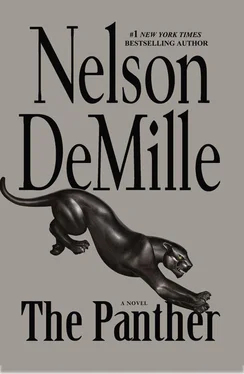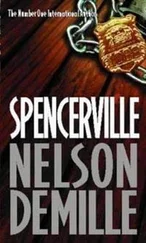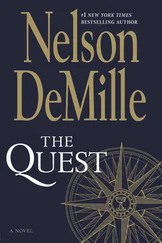Nelson Demille - The Panther
Здесь есть возможность читать онлайн «Nelson Demille - The Panther» весь текст электронной книги совершенно бесплатно (целиком полную версию без сокращений). В некоторых случаях можно слушать аудио, скачать через торрент в формате fb2 и присутствует краткое содержание. Жанр: Триллер, на английском языке. Описание произведения, (предисловие) а так же отзывы посетителей доступны на портале библиотеки ЛибКат.
- Название:The Panther
- Автор:
- Жанр:
- Год:неизвестен
- ISBN:нет данных
- Рейтинг книги:5 / 5. Голосов: 1
-
Избранное:Добавить в избранное
- Отзывы:
-
Ваша оценка:
- 100
- 1
- 2
- 3
- 4
- 5
The Panther: краткое содержание, описание и аннотация
Предлагаем к чтению аннотацию, описание, краткое содержание или предисловие (зависит от того, что написал сам автор книги «The Panther»). Если вы не нашли необходимую информацию о книге — напишите в комментариях, мы постараемся отыскать её.
The Panther — читать онлайн бесплатно полную книгу (весь текст) целиком
Ниже представлен текст книги, разбитый по страницам. Система сохранения места последней прочитанной страницы, позволяет с удобством читать онлайн бесплатно книгу «The Panther», без необходимости каждый раз заново искать на чём Вы остановились. Поставьте закладку, и сможете в любой момент перейти на страницу, на которой закончили чтение.
Интервал:
Закладка:
Nelson Demille
The Panther
PART I
CHAPTER ONE
A man wearing the white robes of a Bedouin, Bulus ibn al-Darwish by name, known also by his Al Qaeda nom de guerre as al-Numair-The Panther-stood to the side of the Belgian tour group.
The Belgians had arrived in a minibus from Sana’a, four men and five women, with their Yemeni driver, and their Yemeni tour guide, a man named Wasim al-Rahib. The driver had stayed in the air-conditioned minibus, out of the hot August sun.
The tour guide, Wasim, spoke no French, but his English was good, and one of the Belgians, Annette, a girl of about sixteen, also spoke English and was able to translate into French for her compatriots.
Wasim said to his group, “This is the famous Bar’an Temple, also known as Arsh Bilqis-the throne of the Queen of Sheba.”
Annette translated, and the tour group nodded and began taking pictures.
Al-Numair, The Panther, scanned the ruins of the temple complex-over an acre of brown sandstone walls, towering square columns, and open courtyards, baking in the desert sun. American and European archaeologists had spent many years and much money uncovering and restoring these pagan ruins-and then they had left because of tribal suspicion, and more recently Al Qaeda activity. Such a waste of time and money, thought The Panther. He looked forward to the day when the Western tourists stopped coming and this temple and the surrounding pagan ruins returned to the shifting desert sands.
The Panther looked beyond the temple complex at the sparse vegetation and the occasional date palm. In ancient times, he knew, it was much greener here, and more populous. Now the desert had arrived from the East-from the Hadhramawt, meaning the Place Where Death Comes.
Wasim al-Rahib glanced at the tall, bearded Bedouin and wondered why he had joined the Belgian tour group. Wasim had made his arrangements with the local tribal sheik, Musa, paying the man one hundred American dollars for the privilege of visiting this national historic site. Also, of course, the money bought peace; the promise that no Bedouin tribesmen would annoy, hinder, or in any way molest the tour group. So, Wasim wondered, why was this Bedouin here?
The Panther noticed that the tour guide was looking at him and he returned the stare until the guide turned back to his group.
There were no other tourists at the temple today; only one or two groups each week ventured out from the capital of Sana’a, two hundred kilometers to the west. The Panther remembered when these famous ruins attracted more Westerners, but unfortunately because of the recent reports of Al Qaeda activity in this province of Marib, many tourists stayed away. He smiled.
Also because of this situation, the Belgians had arrived with an armed escort of twenty men from the National Security Bureau, a para-military police force, whose job it was to protect tourists on the roads and at historic sites. The tourists paid for this service, which was money well spent, thought The Panther. But unfortunately for these Westerners, the policemen had also been paid to leave, which they were about to do.
Wasim continued his talk. “This temple is also known as the Moon Temple, and it was dedicated to the national god of the Sabaean state, who was called Almaqah.”
As the Belgian girl translated, Wasim glanced again at the bearded man in Bedouin robes who was standing too close to his tour group. He wanted to say something to the man, but he was uneasy about him, and instead he said to his group, “This was one thousand and five hundred years before the Prophet Mohammed enlightened the world and vanquished the pagans.”
The Panther, who also spoke English, nodded in approval at the guide’s last statement.
He studied the Belgian tourists. There were two couples in their later years who seemed to know one another, and who looked uncomfortable in the burning sun. There was also a man and a woman, perhaps in their early twenties, and The Panther saw they wore no wedding rings, though they were obviously together, sometimes holding hands. The remaining man and woman were also together as a couple, and the girl who was translating appeared to be their daughter or a relative. He noted, too, that the women had covered their hair with hijabs, a sign of respect for Islamic custom, but none of them had covered their faces as required. The guide should have insisted, but he was a servant of the non-believers.
They were all adventurous travelers, thought The Panther. Curious people, perhaps prosperous, enjoying their excursion from Sana’a, where, as he knew, they were guests of the Sheraton Hotel. Perhaps, though, this excursion was more difficult and adventurous than they had been told by the tour company. So now, he imagined, they might be thinking about their hotel comforts, and the hotel bar and dining room. He wondered, too, if a few of them were also thinking about security matters. That would be an appropriate thought.
Again Wasim stole a glance at the Bedouin, who had intruded even closer to his small tour group. The man, he thought, was not yet forty years of age, though the beard and the sun-browned skin made him appear older. Wasim also noticed now that the man was wearing the ceremonial jambiyah-the curved dagger of Yemen, worn by all males in the north of the country. The man’s shiwal, his head covering, was not elaborate nor was it embroidered with costly gold thread, so this was not an important man, not a tribal sheik or the chief of a clan. Perhaps, then, the Bedouin was there to ask for alms from the Westerners. Even though Wasim had paid Sheik Musa to keep the tribesmen at a distance, if this Bedouin asked for alms, Wasim would give him a few hundred rials and tell him to go in peace.
Wasim again addressed his group. “This temple is believed by some who practice the American Mormon faith to be the place to which the Mormon prophet called Lehi fled from Jerusalem in the sixth century before the Common Era. It was here, according to Mormon scholars, where Lehi buried the prophet Ishmael. And when this was done, Lehi built a great ship for himself and his family and sailed to America.”
Annette translated, and one of the male tourists asked a question, which the young girl translated into English for Wasim, who smiled and answered, “Yes, as you can see, there is no ocean here. But in ancient times, it is believed there was much water here-rivers, perhaps-from the Great Flood of Noah.”
The young woman translated, and the Belgians all nodded in understanding.
Wasim said, “Follow me, please.” He ascended fourteen stone steps and stood before six square columns, five of which rose twenty meters in height, while the sixth was broken in half. He waited for his group to join him, then said, “If you look there to the west, you will see the mountains where the local tribes believe the Ark of Noah came to rest.”
The tourists took pictures of the distant mountains and didn’t notice the bearded man climbing the steps toward them.
Wasim, however, did notice, and he said to the Bedouin in Arabic, “Please, sir, this is a private tour group.”
Al-Numair, The Panther, replied in Arabic, “But I wish to learn also.”
Wasim, keeping a respectful tone in his voice, replied to the Bedouin, “You speak no English or French, sir. What can you learn?”
The Panther replied in English, “I am a poor man, sir, who comes to entertain the tourists in my finest tribal robes.”
Wasim was taken aback by the man’s perfect English, then replied in Arabic, “Thank you, but Sheik Musa has assured me-”
“Please, sir,” said the Bedouin in English, “allow me to pose for photographs with your Western friends. One hundred rials for each photograph.”
Читать дальшеИнтервал:
Закладка:
Похожие книги на «The Panther»
Представляем Вашему вниманию похожие книги на «The Panther» списком для выбора. Мы отобрали схожую по названию и смыслу литературу в надежде предоставить читателям больше вариантов отыскать новые, интересные, ещё непрочитанные произведения.
Обсуждение, отзывы о книге «The Panther» и просто собственные мнения читателей. Оставьте ваши комментарии, напишите, что Вы думаете о произведении, его смысле или главных героях. Укажите что конкретно понравилось, а что нет, и почему Вы так считаете.












